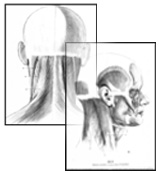Tinnitus is a symptom that results from increased muscle tension in the face, jaws and neck. People with tinnitus can often affect their sound through jaw movements or by touching certain points of the face, jaws or throat/neck. (See animation).
In connection with stress, it is common to experience tinnitus and dizziness. Tinnitus can be experienced as ringing in the ears, beeping sounds, electrical sounds, clicking sounds, cutting sounds or sounds that follow the pulse.
Dizziness can be experienced as unsteadiness, imbalance, the feeling that the body is pulling to the right or left, spinning dizziness, merry-go-round dizziness, the feeling of falling and nausea. Stress can be experienced as worry, anxiety, uncertainty, fear, irritation, anger, impatience and sadness. Stress can also be experienced as being creative, able to perform, wanting control, lack of time and many ideas and constantly on the mind.
With the help of a comprehensive questionnaire, you can easily gain insight into how you feel and how you fit into the description of cause and effect. You get advice and tips on what to do, to start getting rid of the bothersome dizziness, tinnitus, pain, headache, sound sensitivity.
In connection with perceived stress, emotions such as worry, anxiety, impatience and/or irritation are activated. With active emotional expressions or emotions, we get tension in the muscles that are activated by the sympathetic nervous system. In connection with stress, we clench our teeth and tense our jaws during concentration and when we are in our thoughts. After a long period of clenching, teeth grinding, the teeth can start to ache. It can hurt when chewing or drinking cold drinks.
It is common to press the tongue against the teeth and up the palate in connection with stress. It is visible on the tongue if there are pressure marks along the edge of the tongue.

